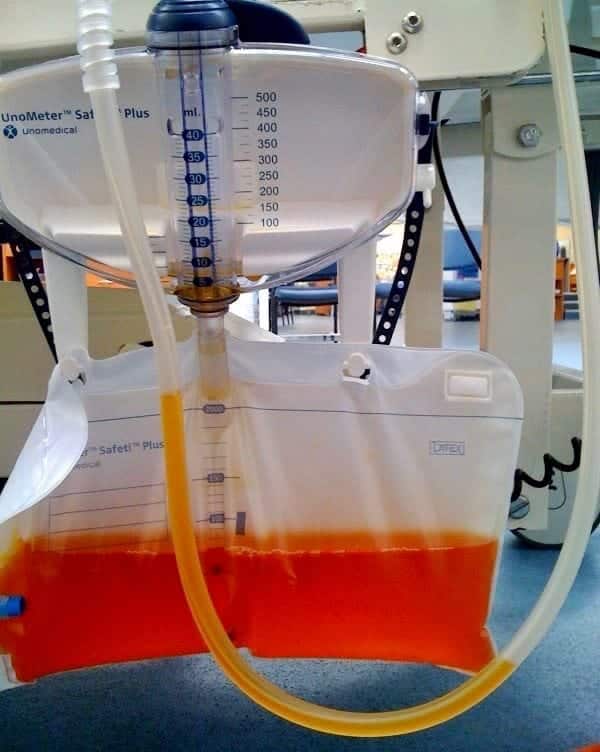Where are the lemons?
aka Unusual Urine 001
You are wandering past the bedside of a 42 year old male with a cerebral abscess…and you notice the colour of his urine
What is unusual about the appearance of the urine?
Unusual Answer
The urine is orange!
What are the possible causes?
Unusual Answer
The causes of orange urine include:
Medications:
- Idarubicin – an anthracycline used for hematological malignancies
- Ferrioxamine – an iron chelator that classically causes ‘vin rose’ urine – tends to be orange to reddish-brown
- Oxamniquine – antischistosomal quinoline selective for S. mansoni
- Phenazopyridine – an azo dye used for analgesia in urinary tract infections – it can cause false-positive urine dipstick results for bilirubin and urobilinogen – can have nasty side-effects
- Rifampicin – see below
- Sulfasalazine – 5-aminosalicylate with a local effect on the bowel wall used in inflammatory bowel disease
- Warfarin – urine may be pink or orange
Foods, supplements, and vitamins:
- Carotenes – e.g. vitamin A, orange juice, pumpkin, and carrots
- B-complex vitamins
- Food dyes – what goes in must come out…
- Senna
- Rhubarb
- Beets and blackberries — urine tends to be red-coloured
Disorders that cause hypercarotenemia:
- Diabetes mellitus
- Dietary excess of carotenoids
- Hyperlipidemia
- Hypothyroidism
- Porphyria
Note: Urine may also appear ‘orange-ish’ as a result of dehydration or jaundice (hyperbilirubinemia).
Hypercarotenemia is associated with yellowish skin without scleral icterus (in contrast to jaundice). It can also cause orange discolouration of cerebrospinal fluid (CSF).
…but what happened in this case?
Unusual Answer
This patient had a cerebral abscess and was being being treated with rifampicin. The orange colour is benign. Other body secretions such as sweat and tears – as well as CSF – may also be discoloured.
Rifampicin is an RNA polymerase inhibitor that is active against most Mycobacteria, most Gram-positive bacteria and some Gram-negative bacteria, eg N. meningitidis, H. influenzae. It is generally reserved for MRSA, mycobacterial infections and prophylaxis of meningitis and epiglottitis. Resistance to rifampicin can occur rapidly if it is used as the sole agent for antibotic therapy.
Adverse effects of rifampicin include gastrointestinal disturbance and elevated liver enzymes. Rarely it may result in Clostridium difficile-associated disease, allergy or hepatitis.
Rifampicin decreases the concentration and reduces the activity of many other drugs. This occurs because rifampicin induces hepatic and intestinal CYP enzymes as well as transporter proteins (e.g. P-glycoprotein). Induction of enzymes and transporter proteins is maximal at about 1 week of therapy and lasts for about 2 weeks after discontinuation.
References
- Singh NK, Mirza N. Elderly woman with orange urine and purple hands. Mayo Clin Proc. 2008 Jul;83(7):744.
- Bandolier – Mythbusters: asparagus and beetroot
- Nickson C. Smith, Bell, and the Art of Observation. LITFL
[cite]
Unusual Urine
Clinical cases
Chris is an Intensivist and ECMO specialist at The Alfred ICU, where he is Deputy Director (Education). He is a Clinical Adjunct Associate Professor at Monash University, the Lead for the Clinician Educator Incubator programme, and a CICM First Part Examiner.
He is an internationally recognised Clinician Educator with a passion for helping clinicians learn and for improving the clinical performance of individuals and collectives. He was one of the founders of the FOAM movement (Free Open-Access Medical education) has been recognised for his contributions to education with awards from ANZICS, ANZAHPE, and ACEM.
His one great achievement is being the father of three amazing children.
On Bluesky, he is @precordialthump.bsky.social and on the site that Elon has screwed up, he is @precordialthump.
| INTENSIVE | RAGE | Resuscitology | SMACC

